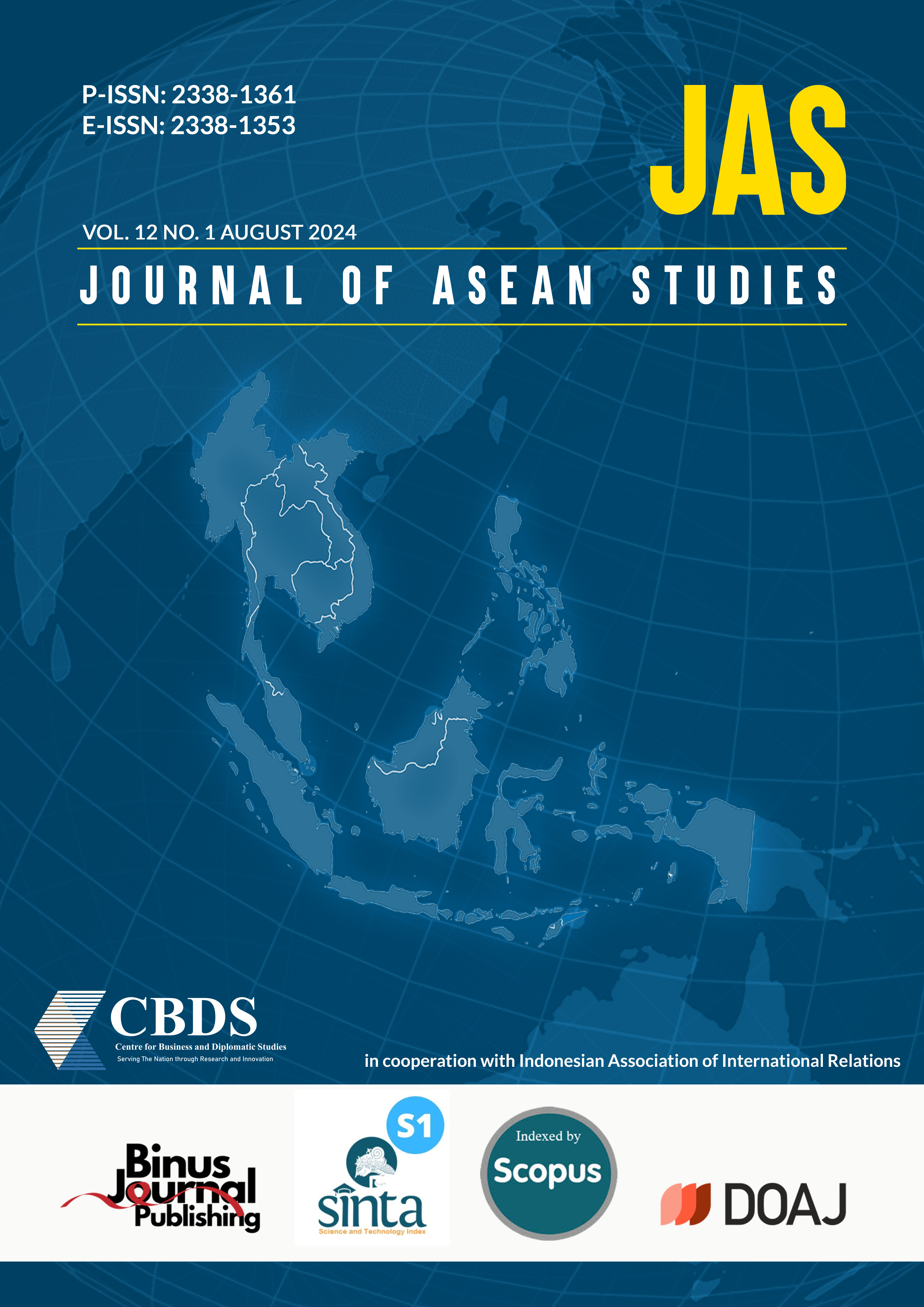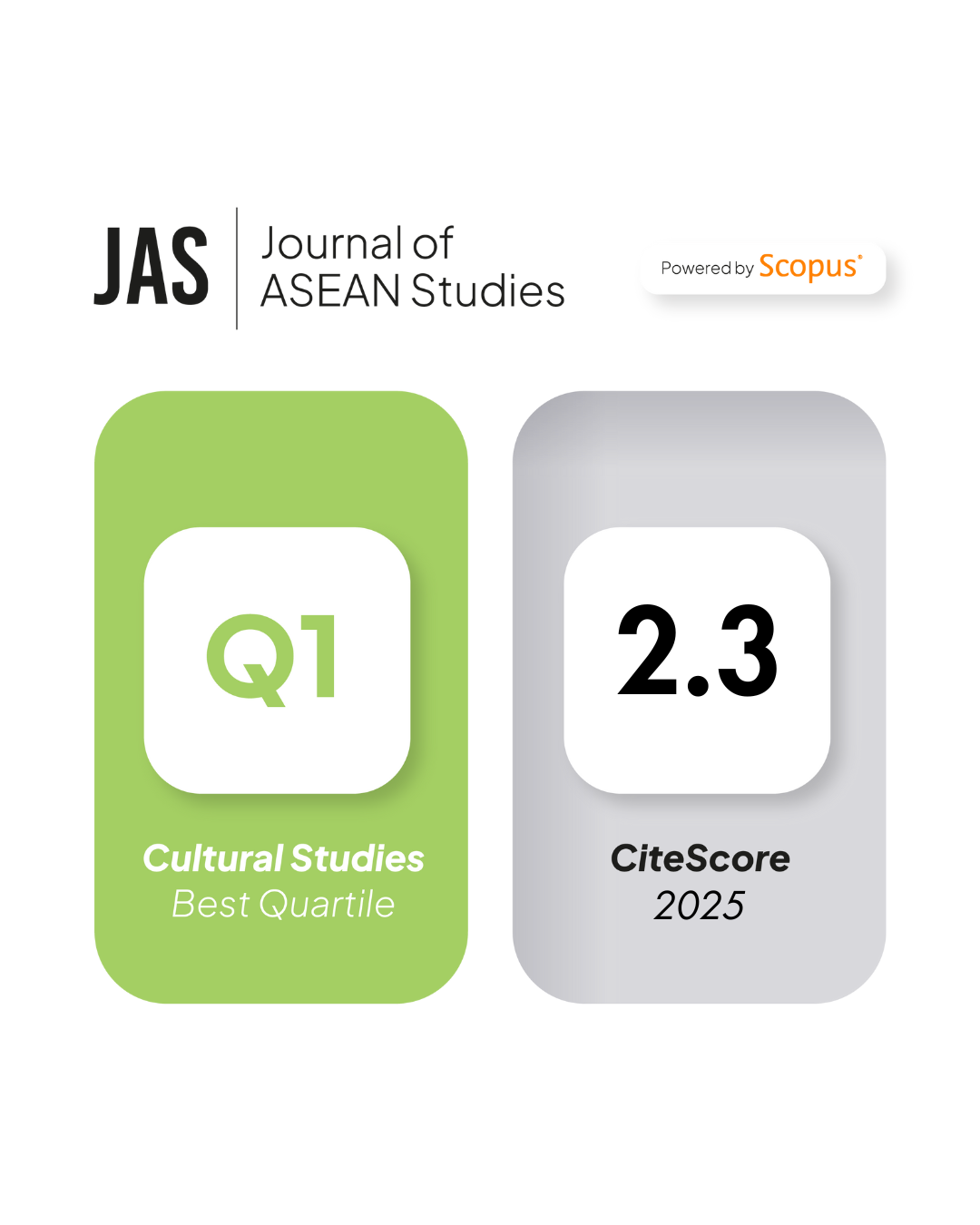The Transformation of Kizukai Habitus on Asian Trainee in Japan: Striving and Competition of Labor Market in ASEAN
DOI:
https://doi.org/10.21512/jas.v12i1.10315Keywords:
Kizukai Habitus, Asian Trainee, Labor MarketAbstract
In the 1990s, Japan faced a severe economic downturn known as the "Lost Decade." To address labor shortages and strengthen economic and political ties with developing nations, the Japanese government has initiated a trainee program to provide individuals from developing countries in Asia with the opportunity to gain work experience in Japan for three years. The research aims to explore the impact of Japan's trainee program on participants who left Japan between 2000 and 2010. Specifically, it investigates how these individuals adapt to Japanese society through the concept of ‘kizukai’ (empathy and concern for others) and examines their success in establishing businesses in their home countries. The research employs an ethnographic approach, utilizing direct interviews and a literature review. The ethnographic method, utilizing direct interviews with former trainees, offers qualitative insights into their social adaptation, business success, and engagement with Japanese cultural practices, enriching the understanding of their lived experiences. The literature review complements this by providing a theoretical framework, particularly Bourdieu's theories of habitus, field, and capital, to analyze the changes in trainees' behaviors and their impact on business practices. The research finds that many trainees have successfully integrated into Japanese society by internalizing Hiroyuki Inoue's concept of kizukai. This integration plays a significant role in their entrepreneurial success upon returning to their home countries, where they establish prosperous businesses. The findings suggest that while the trainee program has shortcomings, it contributes to strengthening international economic relations and offers lessons for improving future trainee programs.
References
Asano, S. (2024). Chinese trainees and host Japanese: Their life and acculturation (part.1). 1(2), 187-212. https://doi.org/10.24546/81000171
Batson, C. D. (2018). A scientific search for altruism: Do we only care about ourselves? Oxford University Press.
BBC News Indonesia. (2023, June 30). ‘Kerja 14 jam sehari, upah disunat, tak ada libur’ - Mahasiswa magang asal Indonesia diduga diperas jadi ‘buruh’ di Jepang. https://www.bbc.com/indonesia/articles/cg6nw6rgy7xo
Cabinet Office. (2019). Japan in 50 years' time based on future population estimates. https://www8.cao.go.jp/kourei/whitepaper/w-2012/zenbun/s1_1_1_02.html
Creswell, J. W., & Creswell, J. D. (2018). Research design: Qualitative, quantitative, and mixed methods approaches (5th ed.). SAGE Publications.
Dewanto, P. A. (2020). The domestication of protection: The state and civil society in Indonesia’s overseas labour migration. Bijdragen Tot de Taal-, land-en Volkenkunde/ Journal of the Humanities and Social Sciences of Southeast Asia, 176(4), 504–531.
Dewanto, P. A., & Hadi, M. S. (2022). Problematika SMK dalam menghadapi industrialisasi: Degradasi keterampilan dan dilema posisionalitas. INFEST Yogyakarta.
Fahreza, F. (2018). Kerjasama Indonesia - Jepang dalam pengembangan sumber daya manusia (Studi kasus pelatihan kerja Technical Intern Training Program - TITP sektor pertanian, perikanan, dan konstruksi. eJournal Ilmu Hubungan Internasional, 6(3), 1079–1092.
Heffernan, T. (2022). Bourdieu and higher education: Life in the modern university. Springer Singapore. https://doi.org/10.1007/978-981-16-8221-6
Human Development Reports. (n.d.). Human development insights. http://hdr.undp.org/en/countries/profiles/JPN
Innovative Organization for Human Resource Cultivation and Encouragement. (2021, July 20). Guidance for technical intern trainees: Only skills? Etiquette too? https://iforce.or.jp/archives/270124
Inoue, H. (2021). Honmono no kizukai. Discover 21 Inc.
Iwashita, Y. (2018). The impact of the technical traineeship program on foreign trainees: An interview-based analysis of repatriated Indonesian technical trainees. Multicultural Relations, 15, 69–77. https://www.jstage.jst.go.jp/article/jsmrejournal/15/0/1569/pdf/-char/ja
Japan Organization of Occupational Health and Safety. (2022). National Institute of Occupational Safety and Health, Japan. https://www.jniosh.johas.go.jp/en/about/doc/jniosh_e_brochure.pdf
Madison, D. S. (2020). Critical ethnography: Method, ethics, and performance (3rd ed.). SAGE Publications, Inc.
Ministry of Health, Labour, and Welfare. (2019). Current status of the Technical Intern Training Program. https://www.mhlw.go.jp/file/06-Seisakujouhou-11800000-Shokugyounouryokukaihatsukyoku/0000212063.pdf
Mitsuno, F., & Imajo, S. (2017). Association between concern for friends, mindfulness, rumination-reflection and friendship satisfaction: Reexamination the factor structure of Concerns Scale. Annual Bulletin of Institute of Psychological Studies, 19, 11–20.
Mori, H. (1999). Foreign workers in the bubble and post-bubble economy in Japan. Journal of International Economic Studies, 13, 83–99. https://www.researchgate.net/publication/32050473_Foreign_Workers_in_the_Bubble_and_Post-bubble_Economy_in_Japan
Osaki, T. (2020). A consideration of Omotenashi. Meijo University Economic and Business Society. https://wwwbiz.meijo-u.ac.jp/SEBM/ronso/no20_4/15_OSAKI.pdf
Oyama, Y. (2017). The effects of “greetings" on humanistic education-Greetings as a foundation of classroom creation & relationship creation. The Humanistic Education Journal, 1, 73–89.
Rustam, M. R. (2023). Violence, silence, and vulnerabilities of migrant workers in Japan: Study of Indonesia technical intern trainees in Japan [Doctoral thesis, Hiroshima University]. Hiroshima University Library. https://ir.lib.hiroshima-u.ac.jp/00054289
Suldina, F. (2018). Productivity entrepreneurship for alumnus apprenticenship kenshusei (Study phenomenology Kenshusei IM Japan). International Journal of Scientific Research and Management, 06(03). http://ijsrm.in/index.php/ijsrm/article/view/1281
U.S. Department of State. (2023). 2023 Trafficking in persons report: Indonesia. https://www.state.gov/reports/2023-trafficking-in-persons-report/indonesia/
Widarahesty, Y. (2018). Knowledge transfer or cheap migrant labor? An analysis of the Japanese foreign trainee (Gaikokujin kenshusei seido) program and its impact on Indonesian migrant workers in Japan. In Association for Asian Studies Annual Conference. https://www.eventscribe.com/upload/planner/links/2018AASConferenceProgram_40.pdf
Downloads
Published
How to Cite
Issue
Section
License
Copyright (c) 2024 Roberto Masami Prabowo, Dade Mahzuni, Yuyu Yohana Risagarniwa, Muhammad Reza Rustam

This work is licensed under a Creative Commons Attribution-NonCommercial 4.0 International License.


























